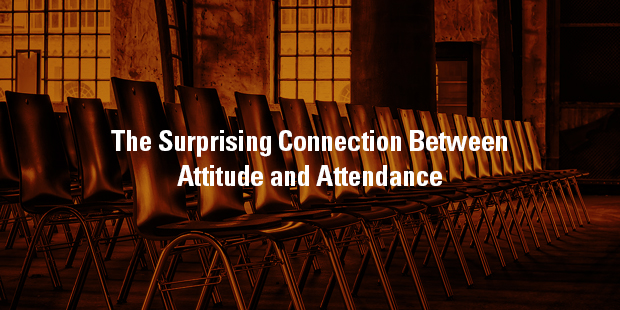
The Surprising Connection Between Attitude and Attendance
There has been much written on declining attendance in churches. Specifically, many of us have addressed the issue of attendance frequency where even “active” church members attend less frequently.
Many pundits have rightly observed the impact of culture on the church, where church is, at best, just another activity. We have also addressed the issue of increasing choices. Many church members and attendees have so many opportunities to do other activities, and they can often afford them like never before. Still others note the increasing numbers of people working on Sunday, precluding them from attending worship services that day. Even more lament the reality that many children’s sports have been moved to Sundays.
These reasons are sound. But behind many of these reasons are attitudinal issues. These attitudinal issues are really the sources of the problem. And there are four attitudes in particular that have a devastating effect on church attendance.
- The attitude that church membership is not biblical. One commenter on this blog challenged me: “Show me where church membership is in the Bible.” I asked her to check 1 Corinthians 12, where Paul said clearly, we are members of the body of Christ. He wrote that letter to a local church in a local community. You might argue that many churches have adapted cultural forms of church membership, where it looks more like a country club membership or a civic club membership. Probably so. But don’t take those biblical deviations to be an excuse not to practice biblical church membership.
- The attitude that we are part of a church primarily to get our needs met. It is this attitude that causes much division in the church. We demand our own worship style, our preferred order of worship, and the building to be built, painted, and arranged just as we demand. But we are to be functioning members of the body of Christ for the greater good of the body. If you have any lingering doubts, read Philippians 2:1-4. Look at verse 3 in particular: “Do nothing out of selfish ambition or conceit, but in humility consider others more important than yourselves.” Take that verse to your next church business meeting.
- The attitude that church leaders are not held to a higher standard. I hear it again and again from pastors and church staff. It’s frustrating that many church members have a lackadaisical attitude about church attendance. But it’s exponentially more frustrating when deacons, elders, and other church leaders do not set the example, when they attend infrequently and demonstrate low commitment. Take a few moments to read 1 Timothy 3:1-13 to see clearly that church leaders are indeed held to a higher standard.
- The attitude that expectation of faithful church attendance is legalistic. For sure, we can turn any admonition into a legalistic trap. But God gave us the gathered body to encourage and love one another. Look at Hebrews 10:24-25: “And let us watch out for one another to provoke love and good works, not neglecting to gather together as some are in the habit of doing, but encouraging each other, and all the more as you see the day approaching.”
We shouldn’t take breaks from our church family any more than we should take breaks from our own family. We are to serve, to love, to encourage and, simply said, to be there.
Declining church attendance has at its core unbiblical attitudes.
It’s time to stop pretending otherwise.

Tags: Church Attendance decline, Thom Rainer, reasons for church attendance decline












